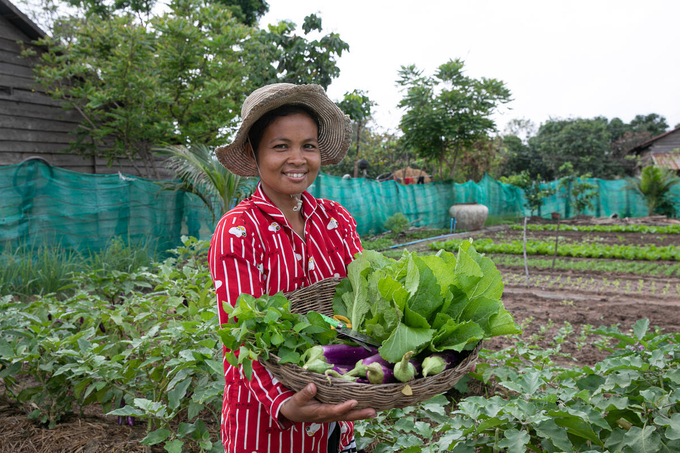November 25, 2025 | 02:42 GMT +7
November 25, 2025 | 02:42 GMT +7
Hotline: 0913.378.918
November 25, 2025 | 02:42 GMT +7
Hotline: 0913.378.918

A woman farmer with a basket of harvested vegetables.
The Food and Agriculture Organization of the United Nations (FAO) welcomes the resolution adopted today by the United Nations (UN) General Assembly to declare 2026 as International Year of the Woman Farmer.
The resolution, which was proposed by the United States of America and adopted by consensus, invites FAO, in collaboration with the other UN Rome-based Agencies, to facilitate the implementation and observance of the International Year of the Woman Farmer.
It also invites UN Member States, organizations of the United Nations System, other international organizations and stakeholders, including civil society, private sector and academia, to increase awareness of the crucial role that women farmers around the world play in agrifood systems, as well as their contributions to food security, nutrition and poverty eradication.
In this regard, the International Year of the Woman Farmer 2026 will serve as a platform for the adoption of effective policies and actions against the barriers and challenges that women farmers face across agrifood systems, as well as to promote gender equality and the empowerment of all women in agriculture.
The observance will also highlight the vital role of peasant women and other rural women in ensuring the economic survival of their families and contributing to both the rural and national economies.
Women in agrifood systems and the challenges they face
FAO’s recent report, The Status of Women in Agrifood Systems, offers comprehensive insights into gender dynamics across agrifood systems. It emphasizes women's participation in socio-economic opportunities and calls on all actors to close significant gaps in women’s productivity and wages, and work to empower women working in agrifood systems.
It also reaffirms FAO's commitment to deepen its focus on gender equality and women’s empowerment, which includes advocating for policy frameworks that seek to address social norms and structural constraints and utilizing gender-transformative approaches to a greater extent in our projects and programming for inclusive rural development.
The report finds that despite comprising 39% percent of the global agricultural labor force, women encounter significant discrimination, confronting challenges in land and livestock ownership, access to quality and secure jobs, equitable pay, participation in decision-making processes, and accessing credit and financial services.
It calls for global commitment to address these entrenched disparities to enhance food security, drive economic prosperity, and advance gender equality within agrifood systems.
Moreover, another recent FAO report, The Unjust Climate, presents a comprehensive analysis of the impacts of climate change on rural populations, with a particular focus on vulnerable groups such as women, youth, and individuals living in poverty.
Drawing on data from 24 countries across five world regions, the report integrates socioeconomic indicators with georeferenced climate data, providing insights into how climate stressors affect incomes, labor allocations, and adaptive strategies. It finds for example that a 1° C increase in long-term average temperatures is associated with a 34 percent reduction in the total incomes of female-headed households, relative to those of male-headed households.
In commemorating the International Year of the Woman Farmer in 2026, FAO acknowledges the pivotal role of rural women in global agrifood systems and commits to addressing the challenges they face. Through concerted efforts and collaboration among Member States, UN entities, civil society, academia, the private sector, Indigenous Peoples, local communities, individuals and other actors, the Year will strive to raise awareness, implement concrete actions, and pave the way for more efficient, inclusive, resilient, and sustainable agrifood systems.
(FAO)

(VAN) Brazil's COP30 presidency pushed through a compromise climate deal on Saturday that would boost finance for poor nations coping with global warming but that omitted any mention of the fossil fuels driving it.

(VAN) Poultry farmers in the UK have been warned that they could face one of the worst winters yet for bird flu.

(VAN) Prices of main-crop paddy have risen sharply, with jasmine rice hitting 16,100 baht per tonne — the highest level in years.

(VAN) In Brazil, FAO unveiled a series of reports and initiatives showing how sustainable agrifood systems are a solution to the climate crisis.

(VAN) With names like neodymium and dysprosium, rare-earth elements sound exotic — and their perceived scarcity has only added to the mystique.

(VAN) In a new study published in Trends in Biotechnology, researchers used a gene-editing technology called CRISPR to increase a fungus's production efficiency and cut its production-related environmental impact by as much as 61%- all without adding any foreign DNA.

(VAN) A top official in Beijing’s Cop delegation says China is committed to clean energy – but US’s absence is a problem.